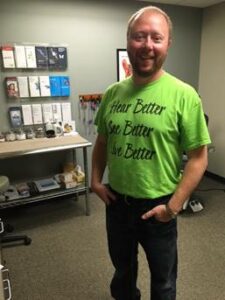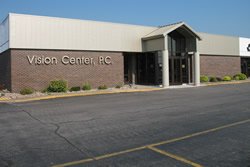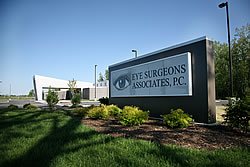Kyle Kuhlman, BCHIS
 There is much discussion regarding the differences in cost and function of hearing aids vs. over-the-counter (OTC) hearing aids and Personal Sound Amplifiers (PSAP). We can help an individual with hearing loss make the right choice.
There is much discussion regarding the differences in cost and function of hearing aids vs. over-the-counter (OTC) hearing aids and Personal Sound Amplifiers (PSAP). We can help an individual with hearing loss make the right choice.
A hearing aid is a device prescribed or recommended by a licensed professional, where a PSAP or OTC device can be purchased at most pharmacies or retail stores. While a hearing aid is capable of being programmed by a professional and in specific frequencies, most OTC or PSAP devices cannot be programmed and are usually set for very mild hearing loss. PSAPs are not considered a medical device nor are they regulated by the FDA. They amplify sounds but do not address other components of hearing loss such as distortion. Should a PSAP or OTC have a volume control, turning it up will turn up most frequencies of sound, including background noises. Most if not all hearing aids these days will have some form of noise management.
PSAPs and OTCs are cheaper than hearing aids, however there are some concerns when bypassing the professional and skipping the hearing test. Hearing loss could be caused by a simple wax blockage or something more serious that requires urgent medical attention. It’s always best to seek out a licensed professional to determine the cause and care of hearing loss.
Regular appointments ensure that proper adjustments can be made to the hearing aids. One benefit of professional care is that the service and cleaning of hearing aid devices is built into the cost during the initial purchase. Appointments are recommended every three to six months for this reason, and these services are included for the life of the instruments.
In summary, get a hearing test first. At Eye Surgeons Associates, hearing tests are free. If your hearing loss is minor and you’re not ready for a hearing aid but would like a little amplification, check out a PSAP. You’ll feel better that there is nothing else going on with your hearing and you’ll have a baseline for possible future hearing loss. Then if your hearing loss is more than you expected, you’ll be in a place where you can get the professional advice that you need.
BIO: Kyle Kuhlman is a board certified, licensed Hearing Instrument Specialist with Eye Surgeons Associates. His expertise is specifically in late-onset nerve deafness in ranges from very mild to severe.
The material contained in this article is for informational purposes only and is not intended to be a substitute for professional medical advice, diagnosis, or treatment. Always seek the advice of your physician or other qualified health care provider.




